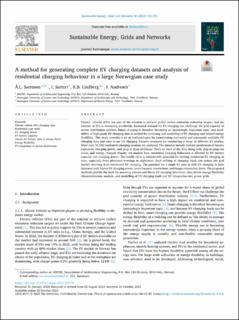A method for generating complete EV charging datasets and analysis of residential charging behaviour in a large Norwegian case study
| dc.contributor.author | Sørensen, Åse Lekang | |
| dc.contributor.author | Sartori, Igor | |
| dc.contributor.author | Lindberg, Karen Byskov | |
| dc.contributor.author | Andresen, Inger | |
| dc.date.accessioned | 2023-11-05T06:01:47Z | |
| dc.date.available | 2023-11-05T06:01:47Z | |
| dc.date.created | 2023-10-29T20:59:54Z | |
| dc.date.issued | 2023 | |
| dc.identifier.issn | 2352-4677 | |
| dc.identifier.uri | https://hdl.handle.net/11250/3100621 | |
| dc.description.abstract | Electric vehicles (EVs) are part of the solution to achieve global carbon emissions reduction targets, and the number of EVs is increasing worldwide. Increased demand for EV charging can challenge the grid capacity of power distribution systems. Smart charging is therefore becoming an increasingly important topic, and availability of high-grade EV charging data is needed for analysing and modelling of EV charging and related energy flexibility. This study provides a set of methodologies for transforming real-world and commonly available EV charging data into easy-to-use EV charging datasets necessary for conducting a range of different EV studies. More than 35,000 residential charging sessions are analysed. The datasets include realistic predictions of battery capacities, charging power, and plug-in State-of-Charge (SoC) for each of the EVs, along with plug-in/plug-out times, and energy charged. Finally, we analyse how residential charging behaviour is affected by EV battery capacity and charging power. The results show a considerable potential for shifting residential EV charging in time, especially from afternoon/evenings to night-time. Such shifting of charging loads can reduce the grid burden resulting from residential EV charging. The potential for a single EV user to shift EV charging in time increases with higher EV charging power, more frequent connections, and longer connection times. The proposed methods provide the basis for assessing current and future EV charging behaviour, data-driven energy flexibility characterization, analysis, and modelling of EV charging loads and EV integration into power grids. | en_US |
| dc.language.iso | eng | en_US |
| dc.publisher | Elsevier | en_US |
| dc.rights | Navngivelse 4.0 Internasjonal | * |
| dc.rights.uri | http://creativecommons.org/licenses/by/4.0/deed.no | * |
| dc.subject | Electric vehicle (EV) charging data | en_US |
| dc.subject | Residential case study | en_US |
| dc.subject | EV charging power | en_US |
| dc.subject | EV battery capacity | en_US |
| dc.subject | Hourly EV battery state of charge (SoC) | en_US |
| dc.subject | Energy flexibility | en_US |
| dc.subject | EV integration in power distribution | en_US |
| dc.title | A method for generating complete EV charging datasets and analysis of residential charging behaviour in a large Norwegian case study | en_US |
| dc.type | Peer reviewed | en_US |
| dc.type | Journal article | en_US |
| dc.description.version | publishedVersion | en_US |
| dc.rights.holder | © 2023 The authors | en_US |
| dc.subject.nsi | VDP::Teknologi: 500 | en_US |
| dc.source.volume | 36 | en_US |
| dc.source.journal | Sustainable Energy, Grids and Networks | en_US |
| dc.identifier.doi | 10.1016/j.segan.2023.101195 | |
| dc.identifier.cristin | 2189684 | |
| dc.relation.project | Norges forskningsråd: 272402 | en_US |
| dc.relation.project | Norges forskningsråd: 257660 | en_US |
| dc.source.articlenumber | 101195 | en_US |
| cristin.ispublished | true | |
| cristin.fulltext | original | |
| cristin.qualitycode | 1 |
Tilhørende fil(er)
Denne innførselen finnes i følgende samling(er)
-
Publikasjoner fra CRIStin - SINTEF AS [5801]
-
SINTEF Community [2247]

